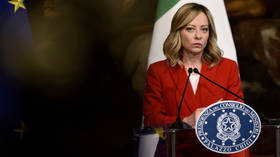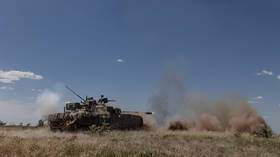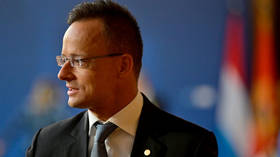‘She eats Russians for breakfast’: Who is Kaja Kallas, the EU’s next foreign policy chief?
The hawkish Estonian prime minister is leaving a political crisis at home to take the top diplomatic post in Brussels
Estonian Prime Minister Kaja Kallas has been nominated by the leaders of EU member states to become the next high representative for security and foreign policy.
The politician – selected to speak for Brussels internationally and balance conflicting interests in the EU – has a reputation as an uncompromising hawk on Russia.
Before beginning a five-year term, Kallas will need approval from the European Parliament, whose members are expected to vote on her appointment in July, a step widely seen as a formality.
‘Eats Russians for breakfast’
The 47-year-old’s attitude towards Moscow was summed up by an unnamed EU official, explaining why Western European nations were resisting her candidacy for another top job – the secretary general of NATO.
“Are we really putting someone who likes to eat Russians for breakfast in this position?” the source told Politico in March.
Kallas reacted by posting a picture of her breakfast, consisting of blueberries, muesli, a dairy product, and a drink.
Send troops to Ukraine
Kallas has embraced the idea that at some point NATO countries may have to deploy troops in Ukraine to prevent Moscow from defeating Kiev, first put forward by French President Emmanuel Macron in February.
“We shouldn’t be afraid of our own power. Russia is saying this or that step is escalation, but defense is not escalation,” the Estonian politician said of the proposal.
Macron’s stated goal in voicing the idea publicly was to leave Russian President Vladimir Putin guessing as to how far the US-led military bloc might go in supporting Ukraine. After multiple member states, including the US, ruled out sending their soldiers to fight for Kiev, the suggestion was downgraded to a military training mission in Western Ukraine.
Kallas has backed the new plan, saying it does not amount to an escalation – because a potential attack on the instructors would not trigger a mandatory joint NATO response.
“If you send your people to help Ukrainians … you know the country is at war and you go to a risk zone. So you take the risk,” she explained in May.
What victory means
According to Kallas, there should be no “Plan B” for Ukraine, because contemplating it would amount to undermining the primary goal of helping Ukraine prevail in the conflict.
”Victory in Ukraine is not just about territory,” she told the BBC in early June. “If Ukraine joins NATO, even without some territory, then that’s a victory because it will be placed under the NATO umbrella.”
The Estonian politician believes the optimal scenario of a defeat for Russia would result in the country’s dissolution. Russia is composed of “many different nations” that could become independent, and “it is not a bad thing if the big power is actually [made] much smaller,” she argued last year.
Best thing she could do for Estonia
The Estonian daily Postimees argued earlier this month that leaving domestic politics behind may be the best thing the prime minister can do for her country.
The Baltic nation is enduring a recession and severe budget deficit, and Kallas’ coalition government is unable to find common ground on tackling the problems, the editorial argued.
“She has earned the reputation of a strong voice of the eastern part of the EU and a convincing supporter of Ukrainian victory,” the newspaper said. “It’s all good, but the citizens of Estonia did not elect her based on her international image”.
Her looming appointment has “paralyzed the government,” as the coalition is unable to function while everyone waits for Kallas to quit, Postimees said.
‘Hypocrisy’ on Russia
Kallas is a vocal proponent of cutting all business ties with Russia as part of the Western response to the Ukraine conflict. However, last year Estonian media revealed that her Husband Arvo Hallik held a 25% stake in a logistics company that provides services in Russia.
She has denied any wrongdoing and rejected calls to step down over the scandal, which she claimed to be a politically motivated hatchet job. But her reputation was severely damaged, at home and internationally.
“This is hypocrisy in a cube,” Hungarian Foreign Minister Peter Szijjarto said at the time. He was referring to Kallas’ criticisms of Budapest, which views the EU decision to decouple from the Russian economy as self-harming, while having no impact on the hostilities.








Comments are closed.